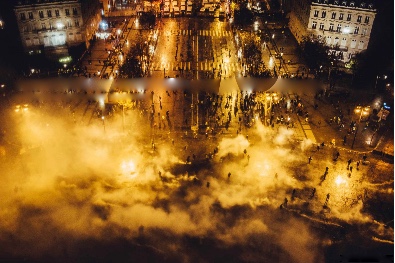Can you really be outside? This is the question I asked Mario the last time we talked (Francesco Matarrese | Greenberg and Tronti: Being Really Outside?). Today, the eighth of January, his important, extraordinary answer arrived. Now it is here, naturally, in the written struggle, in this paper. In art as in politics there is nothing other than struggle Can you really be outside? This is the question. I answer: yes. I am. I feel I am. For sensibility, even before for reason. This world, as it is, as it is historically organized and dominated, does not…
Tag: Class Struggle
Mario Tronti | I am defeated
Under the soles of his shoes, you can still recognise the dirt of history. “This is all that remains. A mix of straw and shit by which we delude ourselves into erecting cathedrals to the worker’s dream.“ Here’s a man, I say to myself, imbued with a consistency that bursts through in a total melancholy. It’s Mario Tronti, the most celebrated of the theorists of Operaismo. He has only recently finished writing a book on this subject: the origins of his thought, how it has changed and what it is today. I don’t know who will publish it (I…
César Vallejo | From “Art and Revolution”
THE REVOLUTIONARY FUNCTION OF THOUGHT Confusion is a phenomenon with a permanent, organic character in bourgeois society. Confusion grows ever thicker when it is addressed as already confusing problems by the very historical terms of its utterance. The latter occurs with the brand new and, at once, very old problem of the intellectual’s obligations with regard to revolution. As posed by historical materialists, this problem is already a tangle. When formulated or simply outlined by bourgeois intellectuals, it acquires the aspect of insoluble chaos. *** “The philosophers,” Marx says, “have only interpreted the world in various ways. The…
Nanni Balestrini | “I close my eyes and start to sing”
NANNI BALESTRINI (1935-2019) I close my eyes and start to sing threads are entangled and transformed into spots whose dance moves ever more slowly I sang my repertoire then I started monologues with my eyes closed I walked back and forth in the cell four steps forward four steps back I invented dialogues for two characters that spoke different languages like at the cinema when the film ends there are those who make love who smoke there are those who merely exist Nanni Balestrini, the radical Italian experimental visual artist, poet, and novelist known for recombinatory, revolutionary…
The Invisible Committee | The Coming Insurrection
From whatever angle you approach it, the present offers no way out. This is not the least of its virtues. From those who seek hope above all, it tears away every firm ground. Those who claim to have solutions are contradicted almost immediately. Everyone agrees that things can only get worse. “The future has no future” is the wisdom of an age that, for all its appearance of perfect normalcy, has reached the level of consciousness of the first punks. The sphere of political representation has come to a close. From left to right, it’s the same nothingness striking the…
Jean-Marie Gleize | A Preparatory Act | Insurrection [8th December 2018: Julien Coupat preemptively arrested]
Saturday, 8 December 2018: Julien Coupat preemptively arrested a preparatory act … successive laws has constructed a system of emergency powers which renews the lois scélérates the charge of “criminal conspiracy to commit a terrorist act” it takes only two people to constitute a “terrorist group” and it takes only a preparatory act for the infraction to be so defined. This preparatory act is not specified relation—even tenuous or remote, even love or friendship—with any of the opposed to common law which criminalizes the acts, the antiterrorist approach implicated in a terrorist activity without having to establish a…
Jacques Rancière | Staging the People
Jacques Rancière | Staging the People The Proletarian and His Double PDF These essays from the 1970s mark the inception of the distinctive project that Jacques Rancière has pursued across forty years, with four interwoven themes: the study of working-class identity, of its philosophical interpretation, of “heretical” knowledge and of the relationship between work and leisure. For the short-lived journal Les Révoltes Logiques, Rancière wrote on subjects ranging across a hundred years, from the California Gold Rush to trade-union collaboration with fascism, from early feminism to the “dictatorship of the proletariat,” from the respectability of the Paris Exposition to…
PROVOKE: Between PROTEST and PERFORMANCE
The short-lived Japanese magazine Provoke is recognized as a major achievement in world photography of the postwar era, uniting the country’s most contentious examples of protest photography, vanguard fine art, and critical theory of the late 1960s and early 70s in only three issues overall. Provoke is accordingly treated here as a model synthesis of the complexities and overlapping uses of photography in postwar Japan. The writing and images by Provoke’s members – critic Taki Koji, poet Okada Takahiko, photographers Nakahira Takuma, Takanashi Yutaka, Moriyama Daido – were suffused with the tactics developed in some Japanese protest books which made use of innovative graphic design and provocatively “poor” materials. Recording…
Italy 1977-8: Living with an earthquake – Red Notes
Italy 1977-8: Living with an earthquake – Red Notes A pamphlet from a time when a very high level of class struggle dominated Italian society. Despite their differences – the state, church, fascists, Communist Party and unions were all united in opposition to the the radical social movement. A. Preface We have called our pamphlet “Living With An Earthquake”. This earthquake is not just the crisis at Government level – it is a quite new political upheaval affecting the whole of Italian society. We have produced this pamphlet because it is vitally important that the outside world should…









